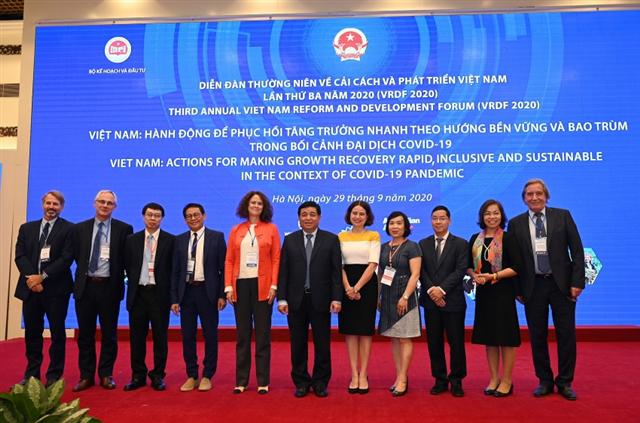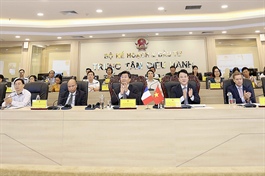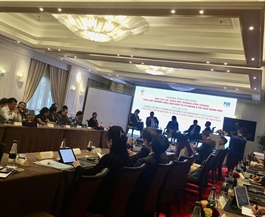Deloitte Vietnam recommends action for Vietnamese businesses to recover with resilience
Deloitte Vietnam recommends action for Vietnamese businesses to recover with resilience
Ha Thi Thu Thanh, chairperson of Deloitte Vietnam, has participated in the third annual Vietnam Reform and Development Forum as a panellist to join the discussion on “Resilient leaders – Persistent businesses sustainable recovery and thrive”, in which she shared practical actions to minimise the impacts of the COVID-19 pandemic and help businesses seize opportunities, recover with resilience and sustainability.

Deloitte Vietnam recommended initiatives and actions for Vietnamese businesses to overcome challenges, grasp opportunities and recover with resilience and sustainability
|
Continuing the success of the second annual Vietnam Reform and Development Forum (VRDF) in 2019, the Ministry of Planning and Investment, in collaboration with the World Bank, organised the third annual forum themed “Vietnam: Actions for Growth Recovery towards Sustainability and Inclusion in the COVID-19 Era”.
Chairs at the event were Minister of Planning and Investment Nguyen Chi Dung and Carolyn Turk, World Bank country director for Vietnam.
Attracting over 200 representatives from government bodies, the forum disclosed problems regarding Vietnam reform and development in the new era; reflected major issues reported by businesses and the people, especially during a time full of emerging opportunities and challenges; and made contributions to the Vietnam Socio-Economic Development Strategy 2021-2030 and the five-year socioeconomic development plan in 2021-2025.
Vietnam’s economic highlights bring many opportunities and challenges for businesses
The US-China trade war and new-generation trade agreements will open up opportunities for Vietnam in attracting foreign direct investment (FDI) or deeply involved in regional supply chain, to enhance production, export capacity, and competition.
The COVID-19 pandemic has had profound negative effects on the socioeconomic development of Vietnam. Specifically, GDP during the first six months of 2020 increased by only 1.81 per cent, the lowest six-month growth rate since 2011. By September 2020, 20 per cent of businesses surveyed said that they had to temporarily suspend businesses while 76 per cent were not able to balance cash flows.
The COVID-19 pandemic has exposed weaknesses within Vietnamese businesses, including challenges that are beyond their control arising on a large regional and global scale that affects all businesses. Various studies conducted nationally and internationally have all come to similar conclusions:
- COVID-19 has different levels of impact on each enterprise by sector, industry, scale, health, and liquidity;
- There are many uncertainties ahead. The pandemic is not yet under control, despite efforts to combat the virus with vaccines and anti-epidemic measures;
- Businesses have no control over their future: all they can do is control their own actions to mitigate further damage.
Recommended actions to turn challenges into opportunities
After researching and assessing the current situation of Vietnamese businesses, Deloitte Vietnam has suggested three groups of solutions with nine practical actions that businesses should take to minimise the negative impacts of the pandemic and focus on healthy, sustainable development, especially during the competitive period of the Trade War and the new generation of FTAs.
Deloitte Vietnam also suggested that every enterprise should review and apply these actions with or without the threat of COVID-19 to promote sustainable development. We claim that these recommendation are fundamental for businesses, even without “sudden” impacts like COVID-19 to ensure business continuity, sustainability, and thus competitiveness.
These nine actions have been divided into three groups with different levels of impact on the businesses, including:
Group 1 – Focus on managing cashflows with high-priority accessible actions to optimise operations with immediate results.
- Review to optimise the cash outflows, set priorities for cash outflows including those for investment and development.
- Debts reconciliation to optimise the financial supply chain, to build a plan to recover debt, or to freeze and reschedule more effectively.
- Optimise operations, focus on maintaining core operations and those directly related to the supply chain of businesses.
Group 2 – Focus on clients and supply chains with actions to optimise the system that businesses can take full control in implementation.
- Reimagine customers and markets because these subjects/factors carry within changes in demand and behaviour.
- Develop and renew programmes focusing on “customer retention” strategy based on the previous demand and behaviour analysis.
- Develop policies to closely engage (in terms of interests) with buyers/suppliers in the same chain.
Group 3 – Review and build suitable business models with strategic, long-term actions for sustainable and resilient business recovery.
- Adjust the products/services to be more efficient. Build suitable priorities in certain periods.
- Review the price strategy and restructure the product/service offerings portfolio.
- Expand the marketing and distribution channels to become more accessible, especially online channels.
Recommendations for key industries and sectors
According to the statistics of the Ministry of Agriculture and Rural Development, in the first six months of 2020, the production value of the agriculture industry increases by 1.18 per cent compared to the same period last year. From the leverage of the EU-Vietnam Free Trade Agreement (EVFTA) and the Comprehensive and Progressive Agreement on Trans-Pacific Partnership (CPTPP), the biggest problem that businesses in the agriculture and agri-food sector are facing is optimising operations, increasing competitiveness, and building the products' brand name and thriving on the global "game". The practical actions that businesses in this sector should prioritise to dominate the game in our home field are actions in Group 2 and Group 3.
In contrast, although tourism and tourism services have seen impressive growth before, they are nearly “frozen” when the second wave of the pandemic returns to Vietnam. According to the GSO, in the first eight months of 2020, revenue from hospitality and catering services was estimated at VND322.5 trillion ($14 billion), accounting for 10 per cent of the total revenue from the industry and dropping 16.4 per cent compared with the data from the same period of last year. Revenue from tourism was estimated at VND13.1 trillion ($569.57 million) in the first eight months, accounting for 0.4 per cent of the total and decreasing 54.4 per cent over the same period last year. Being heavily impacted, businesses in these sectors are advised to follow action 1 and 2 to keep business survive through difficulties, action 4, 7, 8, 9 should be prioritised by businesses operating in the tourism industry.
Resilient leadership – important factor to ensure businesses successfully respond and thrive
Businesses are recommended to consider their current situation, business health, its liquidity, and position in the supply chain when choosing the appropriate measures from these nine proposed actions. However, the decision and implementation of any action depend greatly on the “resilient” level of leaders, as well as how resilient their organisation become.
Leaders who truly are resilient and persevere in guiding, maximising the qualities of "resilience" in the art of operating an organisation, maximising the resilience of teams and the business itself, will be able to seize the greatest opportunity to manage the crisis, at the same time constructing the future, helping their businesses thrive during the post-crisis response and recovery phase as well as in all normal operating conditions or growth conditions.


























